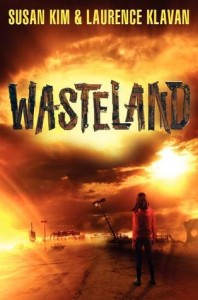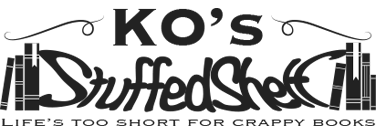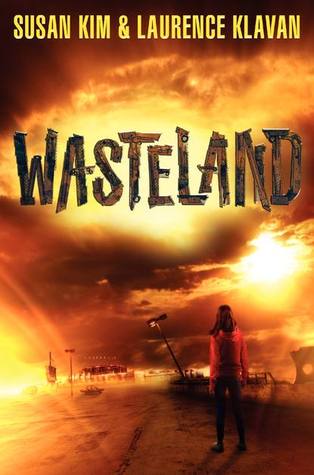 They say that power corrupts, and that absolute power corrupts absolutely. I say that nothing is more powerful than the need for vindication. Two wrongs will never make a right, but in the eyes of someone (who believes they are) grievously wronged, the need for “balance” becomes more of a purpose than a verb. Revenge becomes life, and understanding becomes dust.
They say that power corrupts, and that absolute power corrupts absolutely. I say that nothing is more powerful than the need for vindication. Two wrongs will never make a right, but in the eyes of someone (who believes they are) grievously wronged, the need for “balance” becomes more of a purpose than a verb. Revenge becomes life, and understanding becomes dust.
The back cover of “Wasteland” says it is a “fast-paced trilogy with high stakes…of life or death.”
I disagree.
Though there IS life and death, and yes…the stakes are incredibly high for several characters. “Wasteland” is an expertly plotted look at greed. At suffering, and at one person (of absolute powers) need for revenge.
The most obvious way to start this review would be to tell you about Prin. Explain the intricacies of their civilization, how each person (or should I say child) has a job. How they live under the constant fear of attack, or starvation. I would tell you that the streets are dusty, that abandon shops (such as Starbucks) are turned into shelters. That small children are required to defend homesteads, and that the sick are banished…forced to find their own source of life or die. But I’m not going to do that. For all of that seems fairly obvious. Instead I’m going to explain how the story was built. What works, and what doesn’t. I’m going to elaborate on my opening paragraph, explain why Wasteland’s entire plot is based on rage, revenge, and jealousy. And how it only takes 1 person, to hinder or help sustain life.
The most important thing (I think) is understanding the narration of this novel, because understanding IT, will help you understand where the plot is taking you. First of all, the story is multinarrative, but unlike most YA novels (and yes, I’m aware that is a broad generalization, don’t shoot me for it) the voices (aka narration) isn’t sectioned by chapters. Instead it reads much more like an adult thriller, with multiple personalities appearing in one chapter. To differentiate who is speaking (or whose plot line you are jumping to, for there are several) Kim and Klavan chose to begin (sectioned) paragraphs with descriptives. Sentences designed with the sole purpose of building a scene.
For example:
“On the far end of Prin, the townspeople tried to flee, but it was not use. A dog had his teeth buried in the leg of a girl as she kicked at it, vainly attempting to drag herself into a doorway, her white robes were torn and soaked through with her blood.”
“That night, the spill of electric lights revealed a stubby boy standing outside the massive front door of the Source. In days past, the building seemed to Rafe a sort of blind giant, a faceless god that watched over him and others.”
Choosing to relay the story this way does wonders for world building. The reader has a very vivid (very clear) idea of where they are (or what is going on) before they are bombarded with dialogue.
Now…let’s talk about dialogue for a second since I just brought it up. (Did you see that? It’s what I like to refer to as my lame attempt at a segue.)
The relationship between Esther and Caleb “feels” as if it develops much too quickly (when in reality you are significantly past page 200 when it emerges.) Why? Because we are rarely privy to their conversations. They (until the last 15% or so) are on very different paths. Have their own battles, and own plans. (I can’t fault them for this.) But what little time they DO spend together is glossed over with vague paragraphs about the “things” they chatted about. Cutting the reader out of the majority of those conversations, regardless of how insignificant hinders the reader’s ability to form attachments. Making their relationship appear as (the dreaded) insta-love, instead of a deep meaningful commitment.
For instance:
While the sentiment of this paragraph is clear, we (as readers) are not allowed to FEEL the emotion WITH her. We are offered the categorization of her feelings, not the feelings themselves. That in itself is a sad loss for this book.
Sadder still, is the realization that everything the citizens of Prin had to endure. The losses they suffered and freedoms they so willingly sacrificed were all for the whims of a power-hungry, incredibly jealous man. A man who built a legacy on the foundation of hatred. A man who assumed the world owed him something, when in truth…all it owed him was a little kindness. Kindness that could have been achieved if given half a chance.
They say that “vengeance taken will tear the heart and torment the conscience.” THAT is the heart of Wasteland.
Take it or leave it. For me…it fell somewhere in the middle.
Happy Reading my fellow Kindle-ites and remember: The worst betrayals come from those we trust the most.
| Rating Report | |
|---|---|
| Plot | |
| Characters | |
| Writing | |
| Pacing | |
| Overall: | 3.1 |







